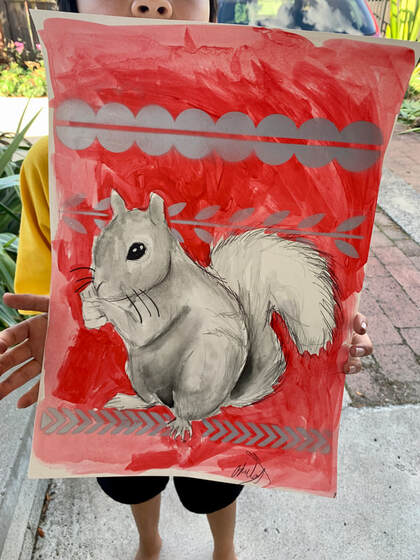This is 10 year old Adrian's squirrel drawing that he completed easily within a 1 hr after school art class, here in my Hamilton, NZ studio. Adrian has mastered Done is Better Than Perfect. ?"Done is better than perfect"...
This is 10 year old Adrian's squirrel drawing that he completed easily within a 1 hr after school art class, here in my Hamilton, NZ studio. Adrian has mastered Done is Better Than Perfect.
?"Done is better than perfect" means that it is much more productive (and kinder to yourself) to complete something, rather than keep reaching for a perfect standard that you can never seem to get to.� And in reaching for perfection, we often end up procrastinating, sabotaging, getting quite upset with ourselves, and make a much bigger deal than the thing usually is.
In my art classes, I do a lot of mindset work with my students.� Not that they even realise this is happening.� Done is better than perfection is one of the key messages that I love to get across to my kiddos, and it applies not only to art class but to life in general.
Here are some examples that you can also use for yourself or your kids in homeschooling, or just at home, or for art teacher or primary teachers to help students, when they are struggling in their art, being hard on themselves, giving up or getting angry:
1. Remember that you are a human.� That's right. You are not a camera or a robot. You cannot possibly copy something exactly, or create exactly what you might see in your mind as being ideal.� Plus when people look at art, they LOVE to see that it was made by a real person and often it really MATTERS WHO the artist is.� That's part of what makes it special.� The marks you make on the paper or canvas will be different to the way I make my marks, because of the way you hold your pencil or brush, and the pressure that you use, and the speed and all that. Your marks are unique.� Like your voice.
2. Consider how long you are going to spend.� KNOW that you are doing a drawing in a set amount of time, and release yourself the intention for perfection, and call it a PRACTISE VERSION/ A TRIAL RUN / A TEST DRAWING.... In my online lessons, as well as my studio art classes for kids, I aim for about an hour of concentrated drawing.� Often less than that because of the talking, thinking, looking etc.� So, let's say you are� actually going to spend 30 min on a sketch.� Remind yourself that you are not here to create a piece of art that will be celebrated the world over.� You are practising a skill.� You are testing out an idea.� You are just giving it a go. If you do small drawings in your sketchbook with the intention of privately trying something, then you can surely be proud of getting that DONE.
3. Be prepared to be surprised No big expectations means you can leave the end result open.� You can start, then stop and check, make another decision, then another on top of that.� When something isn't looking right to you, and you have no expert art teacher around who understands your concerns, then you get to make another choice all on your own.� You can choose to stand back and look at it from further away... You can try using a different medium on it.. You can perhaps paint the back ground first.. Or add darker darks.� Or add some drips or splashes...� Sooo many decisions and they are all YOURS. What ever you do, you will be learning by DOING.�
4. Compare this learning to other life learning examples.�Learning instruments? Cooking? Sport? Tying your shoes?� How did you learn that?� Did you keep practising, or did you give up and throw your shoes out, and just have velcro or jandals for the rest of your life? If you were learning to knit, you would be able to create a beautiful sweater that looks like it came from a shop, at the start of your knitting.� When starting to ride a bike, were you able to do jumps, ride with no hands, etc?� What about driving a car?� When you are ready to start learning do you expect that you'll be perfect at the start or will you give up and never get your licence at all.�
5. Be kind to yourself.� Pat yourself on the back.� You are awesome for giving things a go. For reminding yourself that you are NOT EVEN SUPPOSED TO BE PERFECT when it comes to art.� You are SUPPOSED TO BE UNIQUE.� How cool is it that you are creating some imperfect, fun, new and fresh art!? What else can you say to yourself that is kind? (think old you talking to young you)
6. A moment in time.� This is where you're at now.� The way you look at this is unique to your age, ability, interests, influences etc.� You are always changing and life is changing around you.� If you did this is same thing a year ago or a year from now, it would be different, and different is ok.� It's now.� And it will be DONE.� Which is better than perfect.
7.� Old wrinkly you.� �When you're old and at the end of your long life, what would you say about young you and this art you're making today?� Would you say what a dork you are for not getting it to look like a photo? Would you say that it's wrong? Would you be glad that you gave things a go and got creative, tried new things, tested new ideas, and saved your work so you could look back on it when you're old?� Does young you want to grow as an artist over time?� Will old you BE an artist looking back at how you started and were kind to yourself along your arty journey, or will old you be one of those adults who believes that they are NOT AN ARTIST or thinks "I haven't got an artistic bone in my body" or "I can't draw to save myself."
8. Small changes eventually add up to huge results.� Please never stop learning.� Bit by bit.� Little bits of done.�
Never stop noticing other's art, and the art in nature all around us.� Nothing is perfect.� Love the imperfect.� Embrace the unique. There will be a great story behind what you are looking at there.� And YOUR story of small changes is YOURS. Where do you want to take it?








